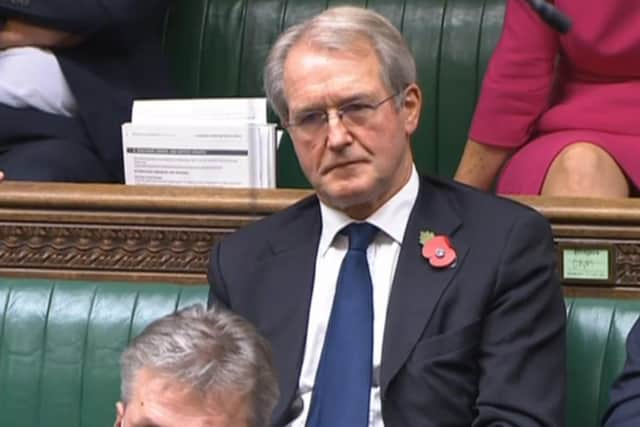Boris Johnson's shameless attempt to save a shady pal was seen for what it was - Euan McColm
Of course, the Prime Minister failed miserably to meet this simple challenge. Rather than showing wise leadership, he entered the conference having worked up a “fish war” with the French.
As if that wasn’t damaging enough, he then tried, unsuccessfully, to subvert our democracy to spare a colleague found guilty of breaking rules on lobbying.
Advertisement
Hide AdAdvertisement
Hide AdOwen Paterson, the charmless Tory MP for North Shropshire, had made a number of approaches to ministers and civil servants on behalf of two companies which, between them, pay him more than a hundred grand-a-year. The independent Commissioner for Parliamentary Standards found that, along with these inappropriate approaches, Paterson had also used his parliamentary office and stationery for consultancy work and failed to declare his interests in some meetings. All of these things, concluded the commissioner, amounted to “serious breaches” of the rules governing MPs’ conduct.


In response to the report, Westminster’s standards committee recommended Paterson face a 30-day suspension, a sanction that would have left him at risk of facing a by-election had a sufficient number of his constituents demanded one.
It is difficult to imagine what was going through the heads of the Prime Minister and those closest to him when they forced through a vote on suspending action against Paterson while the standards system was revamped. No amount of bullshit about this vote having “fairness” at its heart could conceal the fact that Johnson wanted to trash the rules simply to save a friend.
Within minutes of the result of the vote being announced, Tory MPs began receiving emails, hundreds of them.
And nobody was congratulating them. Of course they weren’t because nobody’s that stupid. The Prime Minister’s shameless attempt to break the rules to save a shady pal was seen for precisely what it was.
It fell to the leader of the house, Jacob Rees-Mogg to announce the Government’s inevitable reverse-ferret. Opposition parties had united in declaring they’d boycott any new process and, since a revamped standards system would require cross-party support, the Government would not be proceeding.
Johnson and Rees-Mogg, these entitled men, are just terrible at politics. The humiliation of having to U-turn in the face of public fury was completely predictable.
So why did they go ahead? I’m not sure the reason stretches much beyond Etonian arrogance. These men, and many of their senior colleagues, share the firm belief that they were born and bred to lead despite their unfitness for positions of power. They are nonchalant about money, considering talk of it vulgar while privately feathering their nests with outside interests.
Advertisement
Hide AdAdvertisement
Hide AdWere it not for his strangulated approximation of an American movie director's idea of a British gentleman’s accent, it would be easier to see Rees-Mogg for the spiv he is.
There exists online a television profile of Rees-Mogg aged 12. That weird accent already firmly established, he talks us through his day. We hear him buy shares and watch him write a letter to Prime Minister Margaret Thatcher about the activities of the Greater London Council. Sitting in the back of a chauffeur-driven Roller, Rees-Mogg declares: “I love money. Always have done. With money, you can make more money.”
There is nothing to suggest that, 39 years later, Rees-Mogg’s motivation has changed.
The attempt to spare him from suspension in tatters, Owen Paterson announced his decision to resign as an MP. He would, he said, remain a public servant but “outside the cruel world of politics”. I suppose a world which forbids you from abusing your position to fill your bank account must seem cruel indeed if you’re driven by money.
Owen Paterson was found guilty of breaking the rules by an independent adjudicator to whom he had - despite Tory spin muddying the waters over process - been able to make his case. His departure is no loss to Westminster.
Something the Labour Party now knows - or should know - is that the issue of MPs holding second jobs has the potential to turn toxic very quickly indeed.
While MPs are free to accept lavish contracts from all sorts of sources, we are expected to believe that rules about declaring interests ensure everything remains above board. But how can this ever be so? No serious company shells out tens of thousands of pounds paying MPs without expecting some advantage.
The reason opposition parties won’t go for this particular fleshy part of the Tory belly is that many among them also enjoy the benefit of an extra income, paid solely because they have been elected to Westminster.
Advertisement
Hide AdAdvertisement
Hide AdEvery time an MP takes a wage from an outside source, we are entitled to ask where the line between an acceptable act and the abuse of a privileged position is drawn.
The SNP forbids its MPs from holding second jobs. Labour should follow suit. This might be an unpopular move with the few dozen Labour MPs who hold second jobs but it would free the party up to go after the Tories on a potent issue.
Back in the 1990s, the Conservative Party lost the faith voters when it stumbled through a series of sleaze scandals,. Might the party be at risk of the repetition of history? Would Tory MPs currently holding second jobs welcome further scrutiny of their financial arrangements?
If the answer to this is no (and I’m fairly certain it is, although most would lie “yes” through gritted teeth if asked in public) then the opposition should make that scrutiny a priority.
Comments
Want to join the conversation? Please or to comment on this article.